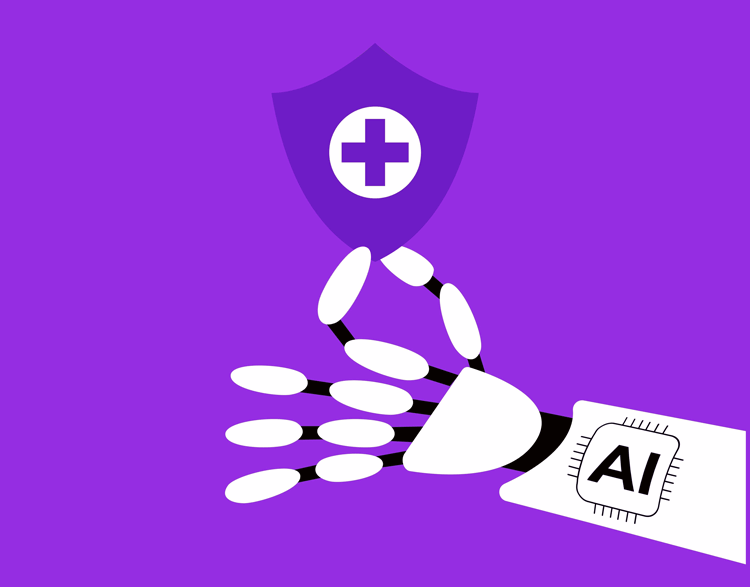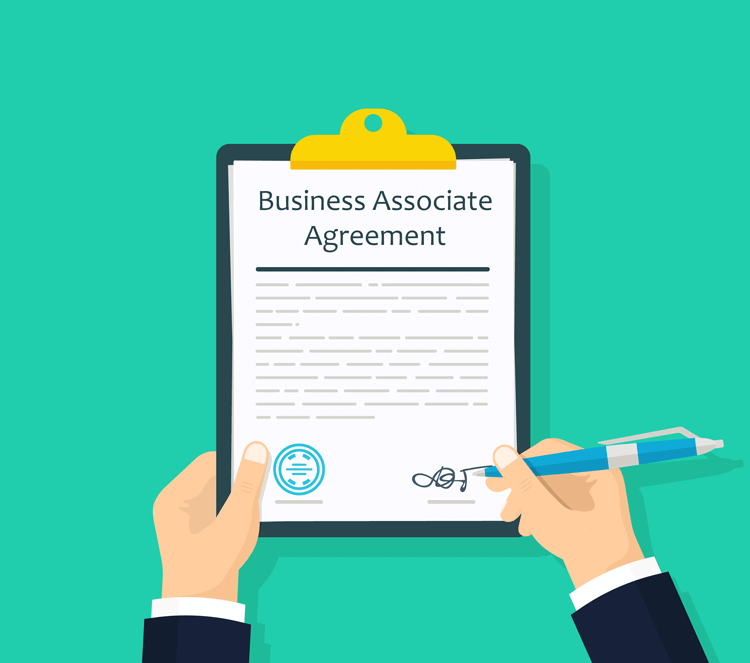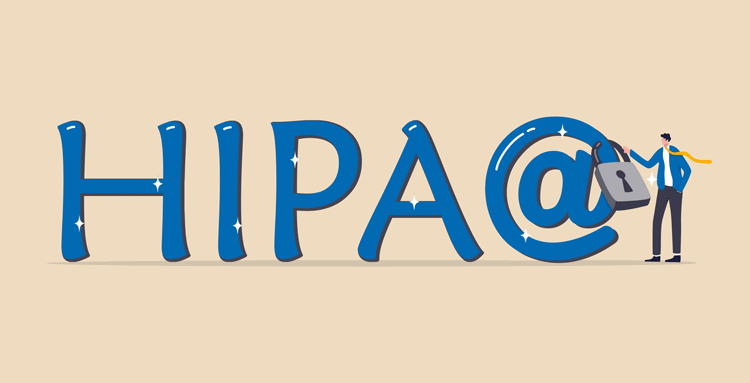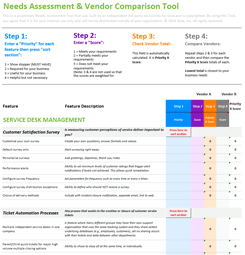ChatGPT and HIPAA: A Thorough Overview Guide for Healthcare IT Professionals
As Artificial Intelligence (AI) like ChatGPT becomes more integrated into healthcare, it promises to enhance efficiency, streamline administrative tasks, and improve patient engagement.
However, the use of AI tools raises critical concerns about data security and compliance with the Health Insurance Portability and Accountability Act (HIPAA). For healthcare providers, understanding how ChatGPT and HIPAA can work together is essential to ensuring that AI tools are used without compromising patient privacy.
This guide will explore how ChatGPT can fit into healthcare within the requirements of HIPAA compliance.

AI in Healthcare: The Promise of ChatGPT and the Privacy Puzzle
Artificial Intelligence is rapidly transforming the healthcare industry. ChatGPT is at the forefront of these innovations. ChatGPT and other AI platforms can extraordinarily help streamline operations and enhance care delivery. These can include anything, from automating routine administrative tasks to improving patient communication and generating insights from vast datasets. Natural Language Processing (NLP) allows healthcare professionals to interact with technology in more intuitive ways. This can free up time for direct patient care and reduce the burden of documentation.
However, this technological promise also comes with a significant challenge: protecting patient privacy under HIPAA. The Act mandates strict guidelines to ensure the confidentiality, integrity, and availability of Protected Health Information (PHI). While ChatGPT can perform many useful functions, the potential for inadvertent exposure of PHI raises serious compliance concerns. AI models process large amounts of data. Without proper safeguards, sensitive patient information could be at risk. This is especially true when the AI models are being trained.
Even though healthcare providers and IT professionals may see many benefits with AI, they must balance innovation with privacy. They will need to understand the limits of ChatGPT in handling PHI while adhering to HIPAA's rigorous standards.
Exploring the ChatGPT HIPAA Connection: What Healthcare IT Teams Need to Know
So, what does HIPAA say about ChatGPT?
Well, in this case, actions speak louder than words. One of the key requirements under HIPAA is that covered entities must enter into a Business Associate Agreement (BAA) with service providers that may handle PHI.
At present, ChatGPT is not HIPAA-compliant because OpenAI does not sign BAAs with healthcare entities.
Furthermore, data retention is another major issue. While OpenAI provides options to opt out of data retention for Application Programming Interface (API) users, any data submitted to ChatGPT is retained for up to 30 days for monitoring purposes. This poses additional compliance risks. As the HIPAA Journal notes, "data sent through the API will be retained for up to 30 days for abuse and misuse monitoring purposes, after which the data will be deleted unless that information must be retained by law." That said, this retention policy still conflicts with HIPAA's requirements for handling PHI.
However, healthcare organizations are not without options. Courtesy of the same HIPAA Journal source, ChatGPT can be used in contexts where PHI has been properly de-identified according to HIPAA standards.
Additionally, compliant alternatives like CompliantGPT or BastionGPT have been developed specifically to address these issues and offer HIPAA-compliant AI solutions.
5 Best Practices for Using ChatGPT in Healthcare While Staying HIPAA-Compliant
Although ChatGPT is not HIPAA-compliant at this time, there are still ways healthcare organizations can use AI tools effectively while maintaining patient privacy. By following these best practices, healthcare IT teams can ensure that AI is used safely and within the boundaries of compliance.
-
Avoid Inputting Protected Health Information (PHI)
Ensure that no PHI or sensitive patient data is entered into ChatGPT or similar AI systems. Training staff to recognize what constitutes PHI and how to avoid sharing it in AI interactions is required for maintaining compliance.
-
Use De-Identified Data Where Necessary
As noted above, make sure that any PHI is de-identified before interacting with ChatGPT. De-identified data removes personal identifiers, such as names or social security numbers, making it safer to use in non-HIPAA-compliant environments.
-
Restrict Access and Set Clear Guidelines
Only authorized personnel who have received training in HIPAA compliance should be allowed to use ChatGPT or other AI tools. Set clear guidelines and procedures to ensure that AI is only used for appropriate, non-sensitive tasks. These can include general inquiries or administrative functions.
-
Monitor AI Use and Conduct Regular Audits
Establish regular audits of ChatGPT usage within your organization. Monitoring how and when AI tools are used can help identify any instances where PHI might have been accidentally shared. These can help enable corrective measures to be implemented quickly. Conversations are usually saved and can be reviewed after logging in at any time.
-
Consider HIPAA-Compliant AI Solutions
If you need to process sensitive patient data through AI, consider using AI solutions that are specifically designed to meet HIPAA standards. There are AI tools available that have built-in safeguards and compliance measures for handling PHI securely.
Real-World Scenarios: How Healthcare Providers Can Leverage ChatGPT Safely
Despite the current limitations of ChatGPT when it comes to HIPAA compliance, there are still various non-sensitive use cases where healthcare providers can use AI effectively. Here are several real-world scenarios where ChatGPT can be safely integrated into healthcare operations without compromising patient privacy:
-
Administrative Assistance
ChatGPT can be a powerful tool for automating routine administrative tasks that don't involve PHI. This includes scheduling appointments, managing non-confidential inquiries, and organizing workflows. By freeing up administrative staff from repetitive tasks, ChatGPT can increase operational efficiency without exposing sensitive data.
-
General Patient Education and FAQs
ChatGPT can be used to provide general health information and answer Frequently Asked Questions (FAQs) related to medical conditions, treatment options, and wellness tips. Since these interactions don't involve personal patient information, the use of AI here remains safe and compliant. Healthcare providers can also leverage ChatGPT for general patient engagement. Some examples might be reminders about annual check-ups or vaccination schedules.
-
Clinical Research Summarization
In research settings, ChatGPT can assist in summarizing clinical studies, guidelines, and literature reviews. While handling non-patient-specific data, ChatGPT can help medical professionals quickly extract key insights from a vast amount of research. This can save time and enhance decision-making processes.
-
Data-Driven Operational Insights
Healthcare organizations can use ChatGPT to analyze general operational, non-PHI data. Some examples might include staffing needs, inventory management, and resource allocation. These insights can help improve efficiency in hospital management and logistics.
-
Non-Sensitive Communication
ChatGPT can be used for general communication purposes, such as appointment reminders, wellness tips, or feedback requests from patients. Since these communications don't involve PHI, they pose no HIPAA risk. They can, however, still enhance patient engagement and experience.
Striking the Balance: Embracing AI in Healthcare Without Sacrificing Compliance
As AI technologies like ChatGPT continue to evolve, they hold tremendous potential to revolutionize healthcare by automating tasks, streamlining administrative processes, and improving patient engagement. However, the integration of AI into healthcare must always be approached with caution. This is especially true when it comes to ensuring compliance with privacy regulations like HIPAA. While AI offers efficiency, innovation, and improved decision-making, healthcare providers cannot afford to compromise on the protection of patient data.
The key challenge lies in finding the balance between using AI's capabilities while maintaining the strict standards required to protect patient information. Healthcare organizations must be diligent in ensuring that AI tools are only used for non-sensitive tasks. This is to make sure to avoid the risk of exposing Protected Health Information (PHI). It means:
- Adopting best practices, such as restricting AI use to de-identified data and implementing user access controls
- Exploring HIPAA-compliant alternatives that are specifically designed for handling PHI
It's clear that the future of healthcare and AI are intertwined. Also, the regulatory frameworks governing the AI's use will continue to advance along with the technology. By adopting a responsible and compliant approach to AI implementation, healthcare organizations can receive the benefits of tools like ChatGPT while safeguarding the trust and privacy of their patients. Finding this balance is necessary to allow for continued healthcare innovation without sacrificing the core principles of privacy and security.
Additional Resources
For readers interested in looking deeper into HIPAA compliance and the responsible use of AI in healthcare, here are several useful resources. They offer practical insights, tools, and guidelines to help healthcare professionals and organizations maintain compliance while leveraging new technologies:
- Giva's HIPAA Resource Center
- Giva's Ultimate 10-Step IT HIPAA Compliance Checklist (Free PDF)
- The Essential Guide for the HIPAA Privacy Officer: Roles, Responsibilities, and Requirements
- Is This a HIPAA Violation? Take Our HIPAA Quiz
- HIPAA and "Body" or "Patient Brokering": Balancing Lead Generation With Privacy Laws
Giva Support Software is HIPAA Compliant
Whether you're in the healthcare industry or not, HIPAA-level security and compliance matters. You need a help desk platform that meets or exceeds the U.S. government's highest standards for protecting your customers' privacy and personal information.
Giva offers that platform! Features include:
- Security-First Approach: We perform regular vulnerability scanning and assessments, log management, anomaly detection and forensic analysis on our full suite of help desk solutions.
- HIPAA/HITECH Compliance Simplified: Our software meets the strictest compliance requirements of the HIPAA and the HITECH Act.
- Multi-Tier Encryption: Giva's HIPAA-compliant data encryption ensures all Protected Health Information (PHI), electronic health and medical records are secure.
- HIPAA-Compliant Backups: We have daily and weekly backups, which enable quick data restoration from encrypted backups when needed.
- Multi-Level PHI and EHR Encryption: Giva uses a multi-tiered security strategy to protect personal records.
Let Giva be your secure, support application service! Book a free Giva demo to see our solutions in action, or start your own free, 30-day trial today!





